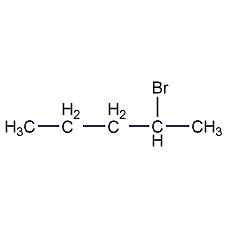2-Bromopentane 2-Bromopentane


Structural formula
| Business number | 02VR |
|---|---|
| Molecular formula | C5H11Br |
| Molecular weight | 151.04 |
| label |
2-Bromo(n-)pentane, Secondary pentane bromide, sec-pentyl bromide, 2-bromopentane, 2-bromopentanone, (±)-2-bromopentane, (±)-2-Pentyl bromide, CH3CH2CH2CHBrCH3 |
Numbering system
CAS number:107-81-3
MDL number:MFCD00000160
EINECS number:203-521-3
RTECS number:RZ9800000
BRN number:1718829
PubChem number:24891999
Physical property data
1. Properties: colorless to yellow liquid with strong odor.
2. Density (g/mL, 25℃): 1.2230
3. Relative density (20℃, 4℃): 1.2075
4. Melting point (ºC): -95.5
5. Boiling point (ºC, normal pressure): 117.4
6. Relative density (25℃, 4℃): 1.2012
7.Refractive index at room temperature (n20): 1.4413
8. Flash point (ºC): 20
9. Refractive index at room temperature (n25): 1.4394
10. Autoignition point or ignition temperature (ºC): Not determined
11. Vapor pressure (mmHg, ºC): Not determined
12. Saturated vapor pressure (kPa, ºC): Undetermined
13. Heat of combustion (KJ/mol): Undetermined
14. Critical temperature (ºC): Undetermined
15. Critical pressure (KPa): Undetermined
16. Log value of oil-water (octanol/water) partition coefficient: Undetermined
17. Upper explosion limit (%, V/V): Undetermined
18. Lower explosion limit (%, V/V): Undetermined
19. Solubility : Insoluble in water, soluble in methanol, acetone, benzene, ether and carbon tetrachloride.
Toxicological data
1. Acute toxicity: rat LD50: 5500mg/kg; mouse inhalation LC50: 33mg/m3; mouse abdominal LD50: 150mg/kg; mouse LD50: 6mg/kg;
2. Other multiple dose toxicity:
Inhalation of TCLo in rats: 2500mg/m3/4H/8W-I; Inhalation of TCLo in rats: 90mg/m3/4H/17W-I;
Ecological data
This substance is harmful to the environment and it is recommended not to let it enter the environment. Can cause pollution to the atmosphere and water bodies.
Molecular structure data
1. Molar refractive index: 32.90
2. Molar volume (cm3/mol): 124.6
3. Isotonic specific volume (90.2K ): 280.6
4. Surface tension (dyne/cm): 25.6
5. Polarizability (10-24cm3): 13.04
Compute chemical data
1. Reference value for hydrophobic parameter calculation (XlogP): 2.7
2. Number of hydrogen bond donors: 0
3. Number of hydrogen bond acceptors: 0
4. Number of rotatable chemical bonds: 2
5. Number of tautomers: none
6. Topological molecule polar surface area 0
7. Number of heavy atoms: 6
8. Surface charge: 0
9. Complexity: 27.1
10. Number of isotope atoms: 0
11. Determine the originalThe number of substereocenters: 0
12. The number of uncertain atomic stereocenters: 1
13. The number of determined chemical bond stereocenters: 0
14 .The number of uncertain chemical bond stereocenters: 0
15. The number of covalent bond units: 1
Properties and stability
Avoid contact with strong oxidants and strong alkali.
Storage method
Stored in a cool, ventilated warehouse. Keep away from fire and heat sources. Protect from direct sunlight. The storage temperature should not exceed 30℃. Keep container tightly sealed. They should be stored separately from oxidants, alkalis, and food chemicals, and avoid mixed storage. Use explosion-proof lighting and ventilation facilities. It is prohibited to use mechanical equipment and tools that are prone to sparks. The storage area should be equipped with emergency release equipment and suitable containment materials.
Synthesis method
1. Obtained from the reaction of pentanol-2 and hydrobromic acid. Add hydrobromic acid to the reaction pot, and add sulfuric acid and pentanol-2 while stirring. Heating and refluxing for 2h. Distill and collect the 115-119°C fraction. After washing with water, dehydrate with anhydrous sodium sulfate and filter to obtain the finished product.
2. Preparation method:

Use 210g (48%) hydrobromic acid, 60g concentrated sulfuric acid, 88g (1.0mol) 2-pentanol (2), and 10g concentrated sulfuric acid, refer to the preparation method of 1-bromopropane, and use a fractionation column The product was evaporated, and the fraction at 115-118°C was collected to obtain 120g of 2-bromopentane (1), with a yield of 79%. [1]
Purpose
As an organic synthesis intermediate, used in drug synthesis.